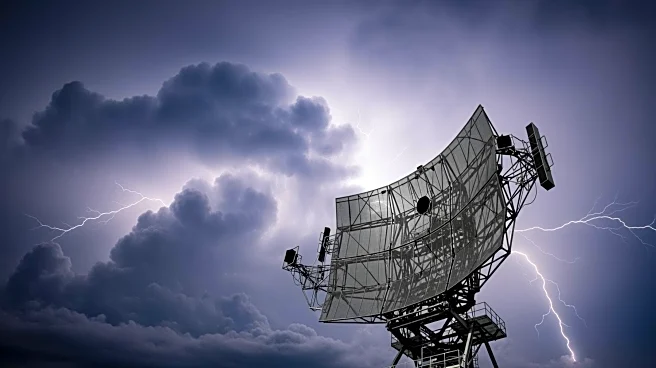What's Happening?
NATO has taken decisive action following recent violations of airspace by Russian drones and fighter jets in several member countries, including Poland and Estonia. These incursions, described as more
aggressive than previous incidents, have prompted NATO to enhance its defense posture on the eastern flank. U.S. Air Force General Alexus Grynkewich announced new measures, including counter-drone strategies under the initiative named Eastern Sentry. The violations occurred amidst stalled negotiations over the war in Ukraine, suggesting an attempt by Russian President Vladimir Putin to intimidate and divide the alliance. However, NATO's response has been swift, with advanced F-35 jets intercepting Russian MiGs and Polish forces shooting down several drones.
Why It's Important?
The recent actions by NATO underscore the alliance's commitment to defending its member states against Russian aggression. This development is significant as it highlights the unity and resolve of NATO in the face of attempts to destabilize the region. The enhanced defense measures serve as a deterrent to further provocations and demonstrate NATO's capability to respond effectively to threats. The situation also reflects broader geopolitical tensions, with implications for U.S. foreign policy and European security. The alliance's coordinated response may influence future diplomatic engagements and military strategies, potentially impacting the balance of power in Eastern Europe.
What's Next?
NATO's response may lead to further diplomatic discussions between the U.S., European leaders, and Russia. President Trump is set to meet with Ukrainian President Volodymyr Zelensky, and discussions with Putin are planned in Budapest. These meetings could shape the future of the conflict in Ukraine and influence NATO's strategic decisions. Additionally, European defense ministers are expected to convene to discuss further measures, including the construction of an integrated defense system along Europe's eastern flank. The ongoing situation may prompt NATO to reassess its defense capabilities and strategies to ensure preparedness against future threats.
Beyond the Headlines
The recent airspace violations and NATO's response highlight the complex dynamics of international relations and military strategy. The situation raises ethical and legal questions about sovereignty and the use of military force. It also reflects the challenges of maintaining alliance cohesion amidst differing national interests. The incident may lead to long-term shifts in defense policies and military spending among NATO members, as they seek to bolster their capabilities in response to Russian provocations.









